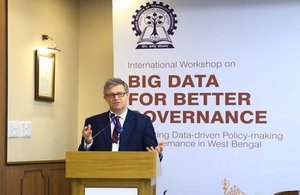Big data must for efficient governance, finds UK-India workshop on data-driven policy making
Collection, analysis and real-time use of authentic data are essential elements in policy formulation, efficient governance and implementation of development programmes.

This was one of the findings of the Indian Institute of Technology (IIT) Kharagpur - British Deputy High Commission (BDHC) Kolkata workshop on ‘Big Data for Better Governance: Promoting Data-Driven Policy Making and Governance in West Bengal’ held in Kolkata on 28 November.
Part of a broader programme, the workshop discussed how data can be better used in policy making, governance, and planning delivery of public services. The workshop agreed that there is a growing need for data in India for formulating evidence-based policies and for planning and delivery of public services with efficiency, transparency and accountability.
Speaking on the occasion, the British Deputy High Commissioner Kolkata, Bruce Bucknell, said:
We generate so much data now that it has become both a challenge and an opportunity. Challenge because there is so much data and we are only at the start of understanding how we can smartly use it. Opportunity - because intelligent analysis and application of data can significantly improve our quality of life.
Bruce Bucknell felt the use of big data by government should improve policy formulation, and lead to more transparent and efficient implementation of policies and programmes. He added:
But data are not just for governments; people from all walks of life can benefit if they have access to data. Data is information – and access to information can be very liberating and empowering.
As part of its Digital India initiative, the Government of India has created an open government platform for data to encourage data driven governance and citizen participation. However, there is a need for building awareness, developing the requisite data infrastructure, regulatory and policy framework and skills in order to make data-led governance a reality.
It was against this background that BDHC Kolkata and IIT Kharagpur conceptualised this ‘Big Data for Better Governance’ project to facilitate data-driven governance in West Bengal. The project aims to stimulate a discussion on the role of big data in governance by demonstrating through case studies how data and digital technology can help policy makers in decision making, planning and delivery of public services and, in the process, help save resources.
The project does this by sharing the UK experience of developing data policy framework, data infrastructure and knowledge base. The project also aims to build a state-level task force comprising of policy makers, researchers and relevant stakeholders, equipped to support the government to implement a successful data programme across the state.
Five UK Experts from University of Strathclyde, Transport for London, NHS National Services Scotland, Institute for Future Cities and tech company Red Ninja are in Kolkata to share their experience and knowledge and interact with local counterparts. Apart from the senior representation from IIT Kharagpur led by Director Professor P P Chakraborty, senior bureaucrats and officials from both the Government of India and Government of West Bengal participated at the workshop.
The interactive sessions were on the role of big data in governance, the need for creation of a new data infrastructure and knowledge base across West Bengal government departments, introduction of a Cross-Government Data Programme, founded on national guideline and international best practices.
The workshop hopes that some of the participating West Bengal government departments will implement a structured data programme in their respective departments to support policy making and contribute to the state level data observatory initiative.
As a follow up to this workshop, the BDHC Kolkata and IIT Kharagpur will hold a two-day technical workshop in 2018 where experts from UK data observatories will share UK experience of building data observatory and UK best practices for creating, preparing, storing and sharing data in select domains with Indian academics, data scientists and data-managers.
Further information
-
Richard Bellingham is Director for the Institute for Future Cities at University of Strathclyde aimed at improving the quality of human life in cities across the world through tackling issues and opportunities related to sustainability, resilience, wellbeing, health, migration and smart cities.
-
Dale Campbell is the Principal Data Scientist for the Data and Analytics team in Transport for London’s Technology (TfL) and Data Directorate. He leads the team that is developing TfL’s understanding of customer and operational data collected from automated data collection systems. He has a strong focus on understanding TfL’s customers and their travel behaviour.
-
Manira Ahmad is the Head of Local Intelligence for NHS National Services Scotland. Manira leads the deployment of Local Intelligence across health and social care. Within the first year, the Local Intelligence Support Team were embedded across all Integration Authorities in Scotland and resulted in co-designing linked data across multiple care sectors to support improved decision making for individuals.
-
Janette Hughes is Programme Manager of the Institute for Future Cities - City Observatory, that tackles whole systems challenges to find solutions for future cities, this includes digital development, analysis and modelling of big data to allow service redesign, policy and business change.
-
Lee Omar is the Founder and CEO of Red Ninja, a design-led technology company that co-creates technology, using their expertise in artificial intelligence, data science, IoT, smart cities, electrical engineering and app development. Lee has worked with the Chief Scientific Advisor to UK government on Foresight Future Cities Project which looked at the opportunities and challenges facing UK cities over the next 50 years.
Media
For media queries, please contact:
Stuart Adam, Head,
Press and Communications
British High Commission,
Chanakyapuri, New Delhi 110021
Tel: 24192100; Fax: 24192400
Mail to: Mainak De
Follow us on Twitter, Facebook, Flickr, Storify, Eventbrite, Blogs, Youtube, Instagram, Snapchat @UKinIndia, Periscope @UKinIndia